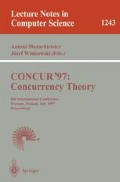Abstract
The simulation preorder for labeled transition systems is defined locally as a game that relates states with their immediate successor states. Liveness assumptions about transition systems are typically modeled using fairness constraints. Existing notions of simulation for fair transition systems, however, are not local, and as a result, many appealing properties of the simulation preorder are lost. We extend the local definition of simulation to account for fairness: system S fairly simulates system I iff in the simulation game, there is a strategy that matches with each fair computation of I a fair computation of S. Our definition enjoys a fully abstract semantics and has a logical characterization: S fairly simulates I iff every fair computation tree embedded in the unrolling of I can be embedded also in the unrolling of S or, equivalently, iff every Fair-∀AFMC formula satisfied by I is satisfied also by S (∀AFMC is the universal fragment of the alternation-free μ-calculus). The locality of the definition leads us to a polynomial-time algorithm for checking fair simulation for finite-state systems with weak and strong fairness constraints. Finally, fair simulation implies fair trace-containment, and is therefore useful as an efficientlycomputable local criterion for proving linear-time abstraction hierarchies.
This research was supported in part by the ONR YIP award N00014-95-1-0520, by the NSF CAREER award CCR-9501708, by the NSF grant CCR-9504469, by the AFOSR contract F49620-93-1-0056, by the ARO MURI grant DAAH-04-96-1-0341, by the ARPA grant NAG2-892, and by the SRC contract 95-DC-324.036.
Preview
Unable to display preview. Download preview PDF.
References
M. Abadi and L. Lamport. The existence of refinement mappings. Theoretical Computer Science, 82:253–284, 1991.
A. Aziz, V. Singhal, F. Balarin, R.K. Brayton, and A.L. Sangiovanni-Vincentelli. Equivalences for fair Kripke structures. In Proc. 21st ICALP, Springer LNCS 820, pp. 364–375, 1994.
S. Bensalem, A. Bouajjani, C. Loiseaux, and J. Sifakis. Property-preserving simulations. In Proc. 4th CAV, Springer LNCS 663, pp. 260–273, 1992.
J.A. Bergstra, J.W. Klop, and E.R. Olderog. Failures without chaos: a new process semantics for fair abstraction. In Proc. 3rd IFIP FDPC, Elsevier, pp. 77–103, 1987.
B. Bloom and R. Paige. Transformational design and implementation of a new efficient solution to the ready simulation problem. Science of Computer Programming, 24:189–220, 1996.
E. Brinksma, A. Rensink, and W. Vogler. Fair testing. In Proc. 6th CONCUR, Springer LNCS 962, pp. 313–327, 1995.
O. Bernholtz, M.Y. Vardi, and P. Wolper. An automata-theoretic approach to branching-time model checking. In Proc. 6th CAV, Springer LNCS 818, pp. 142–155, 1994.
E.M. Clarke, E.A. Emerson, and A.P. Sistla. Automatic verification of finite-state concurrent systems using temporal-logic specifications. ACM Transactions on Programming Languages and Systems, 8:244–263, 1986.
R.J. Cleaveland, J. Parrow, and B. Steffen. The Concurrency Workbench: a semantics-based tool for the verification of finite-state systems. ACM Transactions on Programming Languages and Systems, 15:36–72, 1993.
D. Dill, A.J. Hu, and H. Wong-Toi. Checking for language inclusion using simulation relations. In Proc. 3rd CAV, Springer LNCS 575, pp. 255–265, 1991.
E.A. Emerson and C. Jutla. The complexity of tree automata and logics of programs. In Proc. 29th FOCS, IEEE Computer Society, pp. 368–377, 1988.
O. Grumberg and D.E. Long. Model checking and modular verification. ACM Transactions on Programming Languages and Systems, 16:843–871, 1994.
M.C.B. Hennessy. An algebraic theory of fair asynchronous communicating processes. Theoretical Computer Science, 49:121–143, 1987.
M.R. Henzinger, T.A. Henzinger, and P.W. Kopke. Computing simulations on finite and infinite graphs. In Proc. S6th FOCS, IEEE Computer Society, pp. 453–462, 1995.
R. Hojati. A BDD-based Environment for Formal Verification of Hardware Systems. PhD thesis, EECS Department, University of California, Berkeley, 1996.
O. Kupferman and M.Y. Vardi. Verification of fair transition systems. In Proc. 8th CAV, Springer LNCS 1102, pp. 372–382, 1996.
L. Lamport. Specifying concurrent program modules. ACM Transactions on Programming Languages and Systems, 5:190–222, 1983.
N.A. Lynch and R. Segala. A comparison of simulation techniques and algebraic techniques for verifying concurrent systems. Technical Report MIT/LCS/TM-499, Laboratory for Computer Science, MIT, 1993.
N.A. Lynch and M.R. Tuttle. Hierarchical correctness proofs for distributed algorithms. In Proc. 6th PODC, ACM, pp. 137–151, 1987.
N.A. Lynch. Distributed Algorithms. Morgan-Kaufmann, 1996.
R. Milner. An algebraic definition of simulation between programs. In Proc. 2nd IJCAI, British Computer Society, pp. 481–489, 1971.
V. Natarajan and R.J. Cleaveland. Divergence and fair testing. In Proc. 22nd ICALP, Springer LNCS 944, pp. 648–659, 1995.
A. Pnueli. Linear and branching structures in the semantics and logics of reactive systems. In Proc. 12th ICALP, Springer LNCS 194, pp. 15–32, 1985.
A. Pnueli and R. Rosner. On the synthesis of a reactive module. In Proc. 16th POPL, ACM, pp. 179–190, 1989.
M.O. Rabin. Weakly definable relations and special automata. In Proc. Mathematical Logic and Foundations of Set Theory, Elsevier, pp. 1–23, 1970.
S. Safra. On the complexity of ω-automata. In Proc. 29th FOCS, IEEE Computer Society, pp. 319–327, 1988.
L.J. Stockmeyer and A.R. Meyer. Word problems requiring exponential time. In Proc. 5th STOC, ACM, pp. 1–9, 1973.
A.P. Sistla, M.Y. Vardi, and P. Wolper. The complementation problem for Buchi automata with applications to temporal logic. Theoretical Computer Science, 49:217–237, 1987.
Author information
Authors and Affiliations
Editor information
Rights and permissions
Copyright information
© 1997 Springer-Verlag Berlin Heidelberg
About this paper
Cite this paper
Henzinger, T.A., Kupferman, O., Rajamani, S.K. (1997). Fair simulation. In: Mazurkiewicz, A., Winkowski, J. (eds) CONCUR '97: Concurrency Theory. CONCUR 1997. Lecture Notes in Computer Science, vol 1243. Springer, Berlin, Heidelberg. https://doi.org/10.1007/3-540-63141-0_19
Download citation
DOI: https://doi.org/10.1007/3-540-63141-0_19
Published:
Publisher Name: Springer, Berlin, Heidelberg
Print ISBN: 978-3-540-63141-5
Online ISBN: 978-3-540-69188-4
eBook Packages: Springer Book Archive

